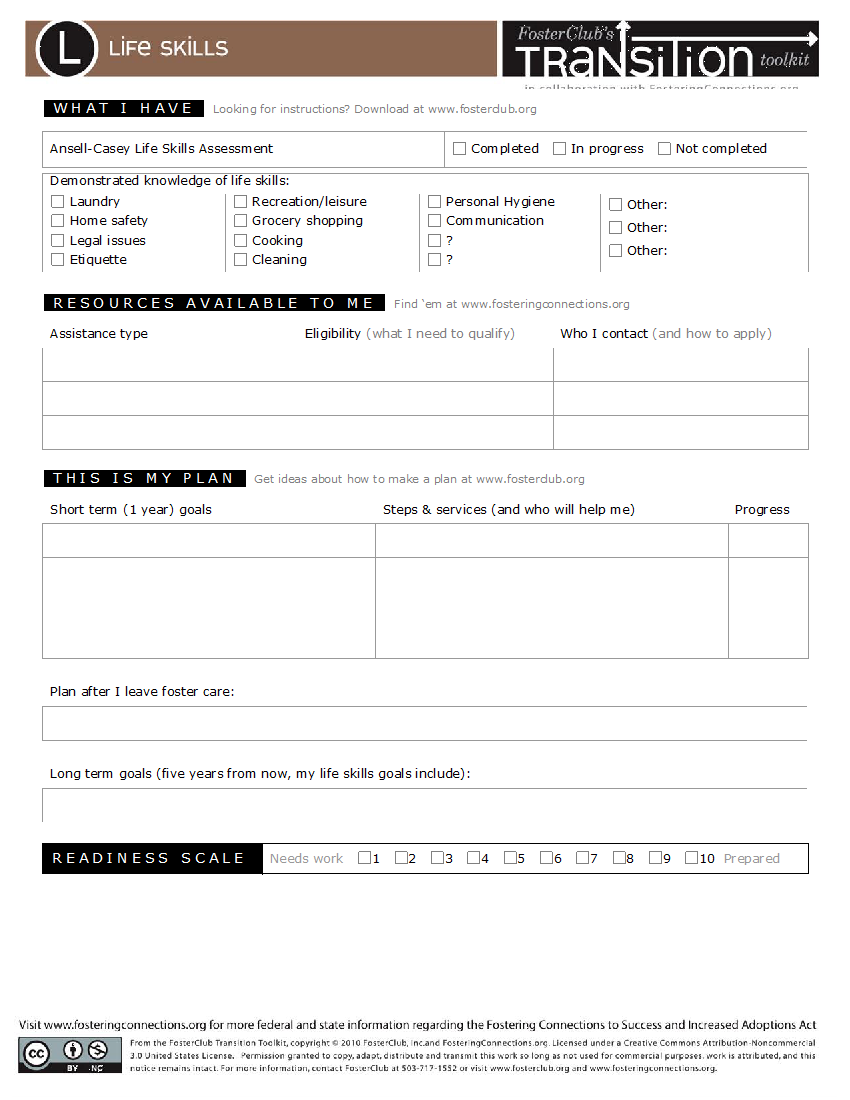Gaining Independence
When you turn age 14, it’s time to ask your social worker to help you start working toward becoming an independent adult. Transitioning to adulthood is a long process that most young people don’t achieve until at least their mid-20s. Federal law requires your social worker to develop a “transition plan” for you before you leave foster care. Your transition plan MUST include:
- Education options
- Job supports and employment services
- Opportunities for mentoring and continuing support services
- Housing options
- Health insurance
Your social worker must also provide you with a list of rights and access to essential documents, such as your credit report.
Your Transition Plan (TILP)
In California, your “transition plan” is called your Transitional Independent Living Plan—TILP for short. You write your first plan with your social worker when you are 14 to 15 years old. You and your social worker update it every six months. You can invite anyone you want to help you with it.
Transitional Independent Living Plan
This is a tip sheet for foster youth who are creating their Transitional Independent Living Plan together with their social worker. Find out how the process works, what realistic goals look like, and what to do if you want to change your goals.
Independent Living Program (ILP)
The purpose of the federal Independent Living Program is to provide you with the help you need to transition successfully to adulthood. ILP is available to help foster youth ages 16-18, and transitioning foster youth up to age 21, in all California counties.
What can ILP do for me?
The services you receive under ILP are based on your individual needs and goals, as described in your Transitional Independent Living Plan. Examples of the types of training, programs and activities provided include:
- Daily living skills
- Money management
- Decision making
- Safety skills
- Career development
- Employment resources
- Medical
- Mental health
- Educational resources
- Help with accessing financial assistance for college or vocational schools
- Housing referrals
An ILP stipend may also provide for independent living needs, such as:
- Bus passes
- Housing rental deposits and fees
- Housing utility deposits and fees
- Work-related equipment and supplies
- Training-related equipment and supplies
- Education-related equipment and supplies
How do I sign up for ILP?
If you are between the ages of 16 to 21 years old, ask your social worker about accessing ILP. If you previously declined ILP services, you are still eligible. It also doesn’t matter whether your case is open or closed. Check out these Frequently Asked Questions About ILP at MyLifeMyRights.org by Public Counsel.
You can also contact your local ILP coordinator directly by using the roster of ILP Coordinators by County. If you want to access services in another state, see ILP Coordinators in Other States.
If for some reason you aren’t able to get ILP services through your social worker or ILP coordinator, call the Foster Youth Ombudsperson at (877) 694-5741.
Know Your Rights!
Taken from the Foster Care Ombudsman web page on Independence.
You are entitled to receive services to help with your transition to adulthood from the Independent Living Program. Your social worker must:
- Make sure that transportation to ILP is provided and/or accessible.
- Make sure you have access to ILP core services (ILP participation cannot be used as a punishment or a reward).
- The county where you live must provide core ILP services.
- The county where your court is must pay the county where you live for the ILP services they provide.
- Make sure that you are able to complete the goals in your TILP.
Casey Life Skills Tool
Casey Life Skills (CLS) is a free tool developed by Casey Family Programs to help you and your social worker or ILP coordinator to identify the small steps you can take to achieve your dreams. It’s an assessment tool, not a test—it gives you a way to build a personal checklist of your skills and strengths.
What kind of life skills does CLS help you think about?
- Maintaining healthy relationships
- Work and study habits
- Using public transportation
- Cooking and cleaning
- Budgeting and paying bills
- Computers and the internet
In addition to the assessment tool, the Casey Life Skills Tool includes the Resources to Inspire Guide. Some resources are intended for social workers and caregivers but you will also find websites, games and activities, advice, and facts that may interest you.
More Tools for Becoming Independent
When You Turn 18: A Survival Guide for Teenagers
This pamphlet funded by the California Bar Foundation is full of good information that may be useful to you after you turn 18 years old. Order copies via email from 18@calbar.ca.gov.
Life Skills Plan
Use this tool to help you identify what life skills you have gained, what resources are available to help you, and what your life skill goals are as you transition into adulthood.
